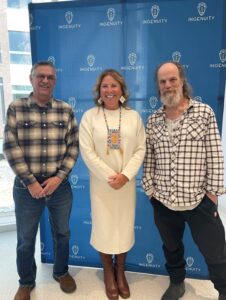Red Rock Indian Band trapper imparts teachings at Lakehead University trapping session

By Rick Garrick
THUNDER BAY — Red Rock Indian Band’s Tom Morriseau Borg recently highlighted his life on the land during Lakehead University’s Trapping as Methodology: The Impacts of Climate Change and Development on the Land session on Feb. 29.
“I’ve been in the bush all my life,” says Borg, a trapper and former environmental monitor at Red Rock Indian Band. “Where I grew up on the shores of Lake Helen, trapping was a part of life. We grew up being taught how to trap from our family and it was a way of life that helped sustain us.”
Borg says his family moved to the community after they had lived mostly on the land for the first 14 years of his life.
“Over the years, I’ve been seeing the disregard and no respect for what goes on in the area,” Borg says. “Forestry was the big one and a lot of the clear-cutting, then the application of herbicide spraying and chemical spraying after the forest is being tended with replantation of trees.”
Borg says he has seen the effects of the herbicide spraying on his trapline.
“I’ve seen the effects of it, being in the bush all the time, a lot of it on my trapline,” Borg says, noting that power-line corridors along his trapline are also sprayed with chemicals. “It’s so detrimental, the hand tending is the way to go but there’s also another way — you plant proper vegetation instead of spraying and a lot of those trees and brush of concern won’t come back.”
Borg says he found his role as Red Rock Indian Band’s environmental monitor to be very rewarding.
“I worked with archaeologists in the area that were doing digs here and there for the proposed new power line that was going through,” Borg says. “I learned so much with that in respect to what is out there. Our First Nations are spread out all over this country and the artifacts we dug up and found proved all of this. A lot of the places now are sacred areas, they’re recognized, some areas they actually rerouted the route for the power line.”
Borg says he learned about the importance of having respect for nature from his uncle, who he used to help with his trapline when we was younger.
“I didn’t have a family at the time, but in so doing that I’ve passed it on to my children and hopefully they’ll pass it on to theirs,” Borg says, adding that he has also been passing on his knowledge about trapping and handling of furs and traps at schools for about eight or nine years. “I also include the respectful way that we should look after what the Creator provided for us. I can see it progressing because we live in a small community here and I see the parents now are involved with the kids, taking them out on the land.”
Borg says being on the land is medicine for him.
“When I spend time at the cabin, I can spend days there,” Borg says. “It’s like a recharge, when I come back I’m recharged. I think it’s because I grew up that way when I was younger, I was always on the land.”
Held as part of Research and Innovation Week 2024 at the CASES Building Atrium on Lakehead University’s Thunder Bay campus, the session also featured Stéphane McLachlan, professor at the University of Manitoba’s Clayton H. Riddell Faculty of Environment, Earth, and Resources. Denise Baxter, vice-provost Indigenous Initiatives at Lakehead University, says McLachlan spoke about his work in supporting Indigenous community research.
“He has received numerous grants over the years, and currently, we have two NSERC (Natural Sciences and Engineering Research Council of Canada) grants, which are [about] working with Indigenous youth and communities to help support the development of the youth in the areas around environmental stewardship that the communities wish to engage in,” Baxter says. “So, part of the work he is doing is supporting the communities’ work to help students who are in university learn how to get involved with community-based research, research that uses Indigenous knowledges at the heart of it.”


